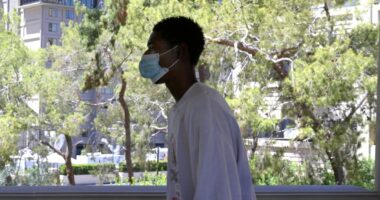
President Biden signed into law a $1.9 trillion coronavirus relief bill that will provide direct payments to many Americans, extend enhanced jobless aid and disburse funds for vaccine distribution efforts, marking his first major legislative victory as president.
“This historic legislation is about rebuilding the backbone of this country,” Mr. Biden said in the Oval Office on Thursday afternoon, one day after the bill passed the House.
The bill signing event is expected to kick off an administration-wide effort to promote the measure to the public, which will include speeches around the country by the president and his top aides. Mr. Biden and Vice President Kamala Harris are scheduled to travel to Georgia next week to discuss the coronavirus package, the White House said.
The White House will host a ceremonial gathering with congressional leaders on Friday to celebrate the signing of the bill, according to aides.
The relief package offers $1,400 payments to many Americans, an extension of a $300 weekly jobless-aid supplement and a one-year expansion of the child tax credit that will provide periodic payments for many households. It also disburses money to schools, vaccine distribution efforts, and state and local governments; provides support to struggling multiemployer pensions; and makes the biggest changes to the Affordable Care Act since its passage in 2010, among other measures.
Later Thursday, the president will deliver his first prime-time address, laying out a plan for getting the pandemic under control one year after much of the U.S. economy ground to a halt as the virus spread.
In the 8 p.m. address, which is set to run under 20 minutes, the president will reflect on the ways the pandemic has upended the lives of millions of Americans, according to White House officials. He will tout his administration’s efforts to secure millions of vaccine doses. And he will outline the next steps he will take to tackle the virus, attempting to strike a balance between projecting hope for the future and offering a realistic assessment of the challenges ahead, officials said.
For Mr. Biden, the speech offers a chance to communicate with a deeply divided country at a crucial moment in the pandemic.
After a year of living under social distancing rules, many Americans are chafing at restrictions on their activities. Some states, such as Texas, have begun allowing businesses to reopen at full capacity and dropping mask mandates against the advice of public health officials. As vaccine supplies increase, the country is grappling with the task of distributing the shots quickly and fairly.
Health officials predict that life may slowly start to return to normal as larger portions of the population get vaccinated, but pandemic-related restrictions are likely to remain in place for some time. The Centers for Disease Control and Prevention said this week that vaccinated people can gather in small groups with others who have received their shots. But it recommended that those who have been immunized continue to wear masks in public and refrain from travel.
Mr. Biden is delivering his speech one year after then-President Donald Trump delivered his own address on the coronavirus, describing what the nation faced as “just a temporary moment of time that we will overcome as a nation and as a world.”
Mr. Trump announced in the speech that his administration would impose restrictions on travel from Europe into the U.S., and he promised small business loans and financial assistance to those hardest hit by the pandemic. That same day, the World Health Organization declared that the outbreak was a pandemic, and the State Department advised U.S. citizens against all travel abroad.
Since taking office, Mr. Biden and his team have worked to increase the U.S. supply of vaccines. He reached deals with Pfizer Inc. and Moderna Inc. to provide a total 600 million doses of their two-shot vaccines, enough supply to vaccinate the eligible U.S. population.
On Wednesday, Mr. Biden directed his administration to secure an additional 100 million doses of Johnson & Johnson’s Covid-19 vaccine, a move that would double the company’s previous commitment to the U.S. Biden administration officials said they hope to secure excess vaccine supply in case additional doses are needed for booster shots or to vaccinate children. The vaccines aren’t approved for those under 16 years old.
In his first 50 days in office, the president has made a point to publicly mourn the death toll from the virus, and he is expected to do so again during his prime-time speech. As of Thursday, more than 529,000 people have died in the U.S. as a result of the virus, according to data compiled by Johns Hopkins University. The U.S. has reported more than 29 million Covid-19 cases.
The coronavirus relief bill signing was initially scheduled for Friday, but the legislation was delivered to the White House faster than aides expected.
Republicans called the aid package bloated and said it included Democratic priorities that weren’t related to the pandemic. The legislation didn’t receive any Republican support in Congress.
Mr. Biden and his aides believe the Obama administration didn’t do enough to sell the benefits of the 2009 stimulus law. They are planning to make speeches, conduct local media interviews and put in place a digital strategy to make sure the public understands Covid-19 measure.
Copyright ©2020 Dow Jones & Company, Inc. All Rights Reserved. 87990cbe856818d5eddac44c7b1cdeb8









